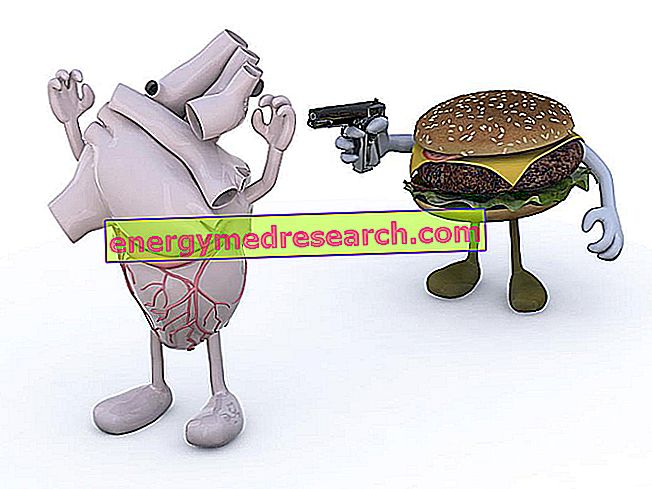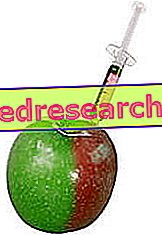Premise
hypoglycemia, hyperglycemia and blood glucose regulation
Hypoglycemia is the medical condition whereby the rate of glucose in the blood, under fasting conditions, is lower than the values considered normal; hyperglycemia is the opposite condition, namely the presence of a fasting level of glucose in the blood, higher than the values considered normal.

GLYCEMIC VALUES TO FAST (mg / dl) * | |
HYPOGLYCAEMIA | <60 |
NORMAL | 60-100 / 110 |
HYPERGLYCEMIA | > 100/110 |
ADJUSTMENT OF GLYCEMIA
The carbohydrates taken with the diet, especially through the consumption of sweets, cereals and fruit, are the object of biological processes that transform them into glucose, a simple sugar.
Glucose is the main source of energy for the body's cells, which it reaches through the blood.
Two key organs in glucose metabolism are the liver and pancreas ; the first provides to manage the glucose reserves, subtracting or introducing the latter into the bloodstream as needed; the second, with its hormones insulin and glucagon, influences glucose-related liver activities and establishes, based on the actual availability of glucose, how much of this simple sugar must pass from the blood to the cells.
Entering more specifically,
- The main functions of insulin secreted by the pancreas are: to facilitate the passage of glucose from the blood to the cells and to favor the accumulation of glucose in the form of glycogen ( glycogenosynthesis ) in the liver.
Insulin therefore has a hypoglycemic action, meaning it lowers blood sugar.
- The main functions of the glucagon secreted by the pancreas are: to promote, in the liver, the production of glucose from glycogen ( glycogenolysis ) and to stimulate the generation of glucose from some amino acids, lactic acid and glycerol ( gluconeogenesis ).
In practice, glucagon covers tasks opposite to those of insulin: if the latter "builds" glycogen from glucose, the former creates glucose from glycogen and other sources.
Glucagon raises blood glucose, consequently it has a hyperglycemic action .
Thanks to the coordinated activity of the liver and pancreas, the human body is able to maintain a constant concentration of glucose in the blood, without excessive variations, regardless of the availability of food in the short period of time.
In light of what has been said so far, therefore, the amount of glucose in the blood is a fundamental indicator of the organism's function and its excess - the already mentioned hyperglycemia - and its defect - the already known hypoglycemia - represent two dangerous situations for the survival of the individual.
Hyperglycemia, first of all, and hypoglycemia, secondly, are two very common pathological circumstances in people with diabetes mellitus ; with the term diabetes mellitus doctors refer to a disorder of glucose metabolism, resulting from an alteration in the production or use of the hormone insulin.
What is a hypoglycemic crisis?
The hypoglycemic crisis is the phase that elapses between the time when the blood sugar drops significantly below the values considered normal (hypoglycemia) and that in which the blood sugar rises, returning to normal, due to a therapeutic intervention,
It is during a hypoglycemic crisis that an individual complains of the classic symptoms of hypoglycemia .
Causes
The possible causes of a hypoglycemic crisis are:
- The excessive administration of insulin or hypoglycemic agents, or a variation in the times of administration of the aforementioned drugs, a variation that may be due for example to a mishap, an forgetfulness etc.
It should be noted that these two occurrences only concern patients with diabetes mellitus, who, to avoid hyperglycemia, must follow a special therapy to maintain normal blood sugar levels.
In light of this, therefore, in diabetics, episodes of hypoglycemic crisis are a complication due not so much to diabetes mellitus per se, but rather to therapy implemented;
- Poor intake of sugar and / or carbohydrates, in a context of prolonged fasting;
- Alcohol intake on an empty stomach;
- Intense and prolonged physical efforts;
- Repeated vomiting episodes;
- Insulinoma, an endocrine tumor of the pancreas, which causes insulin overproduction;
- Adrenal or pituitary diseases, whose hormones regulate circulating insulin levels;
- Severe liver diseases (eg: liver cirrhosis);
- Intake of some specific drugs in a context of renal failure. This is the case, for example, of quinine, in the treatment of malaria.
Risk factors of the hypoglycemic crisis
To favor the episodes of hypoglycemic crisis are:
- The presence of diabetes mellitus, repeated vomiting, severe liver disease or insulinoma;
- Alcoholism;
- Rigid low-calorie dietary regimes;
- The tendency to perform intense physical exertion on an empty stomach.
Symptoms and complications
The typical symptoms and signs of a hypoglycemic crisis are:
- Headache and dizziness;
- Tremor;
- agitation;
- Excessive irritability;
- Difficulty in concentration;
- Pale skin and cold sweats;
- Strong sense of hunger;
- Palpitations;
- Tingling sensation around the mouth;
- Sense of fatigue;
- Sense of anxiety.
If the drop in blood sugar is particularly important, these newly mentioned disorders are also supplemented by:
- Visual disturbances;
- Confusion and anomalous behavior, which make it impossible to carry out the most normal daily activities;
- Convulsions;
- Sense of fainting or fainting proper;
- Epileptic attacks.
Complications
Failure to treat a severe hypoglycemic crisis can be responsible for damage to the nervous system (brain in particular) and, in some cases, even to the death of the person concerned.
COMPLICATIONS OF REPRODUCTED HYGIENIC CRISIS
Repeated episodes of hypoglycemic crisis may cause the body to lack sensitivity to hypoglycemia, so that the individual involved no longer feels when an excessive drop in blood sugar is taking place. This clearly entails the failure to resort to timely treatment.
In general, the tendency to experience repeated hypoglycaemic crises concerns people with serious illnesses (eg: diabetes mellitus, insulinoma, cirrhosis of the liver, etc.).
When should I go to the doctor?
The phenomenon of hypoglycemic crisis makes a medical consultation absolutely necessary, when it is a circumstance that tends to repeat itself or is part of a context of diabetes mellitus.
Therapy
The hypoglycemic crisis requires immediate treatment, aimed at bringing the blood sugar back to normal.
This treatment varies depending on whether the patient is conscious or not; indeed
- If the victim of the hypoglycemic crisis is conscious and can take food by mouth, the above treatment consists of administering sugar, honey, candy or a sweetened beverage. As can be guessed, it is a therapy that can be easily implemented even by the patient himself, when he realizes what is happening to him;
- If the victim of the hypoglycemic crisis is unconscious and cannot ingest anything, the aforementioned treatment involves the administration of glucagon or glucose intravenously. Clearly, this type of treatment must take place in appropriate venues and it is up to professional figures prepared to intervene in such circumstances.
Once the crisis is overcome, it is advisable for the doctor to analyze the triggers and set up an appropriate causal therapy (or review the causal therapy already in progress, if the patient is not new to hypoglycemic crisis).
What can the rescuer do for a person suffering from a hypo?
Those who come across an unconscious individual due to a hypoglycemic crisis can help the latter with the following actions:
- Put a pinch of sugar under the patient's tongue (it is absolutely necessary to avoid the administration of liquids!);
- Call 118;
- If the patient is breathing, place him in the so-called lateral safety position.
Prevention
People without particular pathologies can prevent the hypoglycemic crisis by avoiding prolonged fasting and extreme physical exercise on an empty stomach.
Prevent a hypoglycemic crisis in case of diabetes mellitus
The prevention of hypoglycemic crises in the presence of diabetes mellitus is a topic of extreme interest, given the spread of the aforementioned disease and the ease with which it is accompanied by marked drops in blood sugar.
In this regard, doctors recommend that patients:
- Take the prescribed medications regularly;
- Always carry foods rich in sugars (eg: chocolates, sweetened soft drinks, honey, raisins, etc.), to deal promptly with a possible drop in blood sugar. If the latter occurs, it is important to take the above mentioned foods in the right quantities and measure their effects on the blood sugar with a portable meter, so as to avoid rebound hyperglycemia.
Continue: Hyperglycemic Crisis - What to do? »



